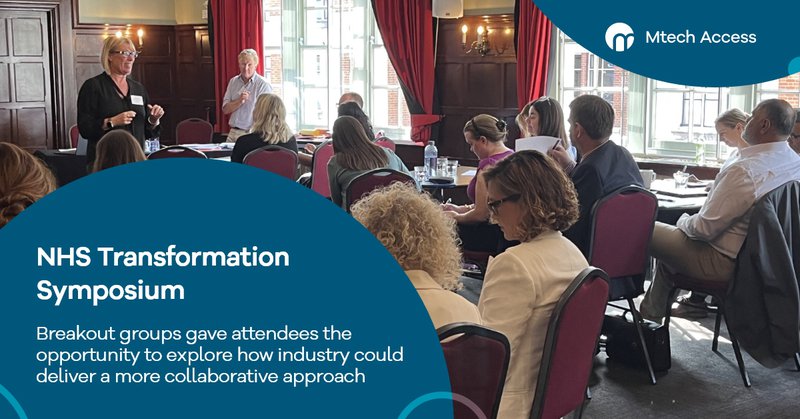
Richard Marsh shares his reflections on the key themes that developed at our NHS Transformation Symposium on 26th September 2023. These include the operational and strategic challenges facing the NHS, the historic focus on inputs rather than outputs, and the call-to-action from our NHS speakers for a more collaborative relationship with and across industry.
Richard has previously held positions as UK Market Access Director at AbbVie, Allergan and BMS. Over to Richard…
An NHS in need of treatment?
If the NHS were its own patient, for what would it be treated?
There are undoubtedly several answers to that question. The phrase ‘multiple comorbidities’ may indeed spring to mind. But a promising diagnosis for the NHS’s principal ailment would be “inputitis”. Medical purists may well point out that this is simply to say that its inputs have become inflamed. Yet this, in a sense, was the message delivered by Dr Penny Dash, the opening speaker at Mtech Access’ recent NHS Transformation Symposium.
The wearer of several healthcare hats, Penny spoke to the meeting mainly from the basis of her experience chairing the North West London Integrated Care System. Eschewing the traditional formula for what is holding the NHS down – too little money dug in against too much demand – she focused instead on two areas. Firstly, the surfeit of top-down directives, usually inspired by whatever is the political obsession of the day. Secondly, and above all, an exaggerated concern with what goes into the delivery of healthcare. As opposed to what we get out of it.

Anyone who follows NHS political debates will know that, sooner or later, someone will complain about the number of hospital beds. As if the health service should be measuring itself by the same standards as a furniture retailer. At the same time, it is generally understood that the aim and direction of health policy should be towards prevention; keeping people from needing a hospital bed in the first place. Logically, a long-term fall in the number of beds should be a sign that things are working.
Inputs versus outputs
It is all too easy, however, to adopt a knowing attitude about the failings of NHS management culture while overlooking the fact that “inputitis” is an important watch-out for industry itself. For companies approaching the NHS, the malady manifests as a focus only on the product – industry’s “input” – rather than on the outcomes the product might help achieve or the problems it can solve.
That is not to say that companies do not present their products in terms of the benefits they confer. But what can get forgotten is that the best outcomes are only achieved if the product is used in the best possible way.
This is not always straightforward and takes effort, resource, and partnership to achieve. It also takes an openness (not always a given) to change. It is often only a long-term, rather than short-term, gain.
Dr Penny Dash offered the example of “virtual wards”. These are an important and promising innovation, with obvious benefit potential for both patients and the health service. Yet the NHS is still in the business of working through all the implications of what caring for patients “virtually” means. It is only when we understand those wider effects in context that we can properly assess the value of the various types of technology that make virtual wards an achievable reality.
The power (and challenges) of transformation
Products that are truly innovative are, almost by definition, those that bring about significant transformation. Yet transformation can be an uncomfortable and sometimes unwelcome experience. Especially in an organisation such as the NHS, which is beset by day-to-day pressures and with little or no headspace for seeing the bigger picture.
It should, therefore, be fundamental to the nature of industry–NHS partnerships that they are focused on helping the health service to work through the challenges that transformation brings, and to emerge stronger and better on the other side.
Industry needs to approach this task in the spirit of foresight and not just hindsight. This means looking ahead to the consequences of adopting this or that technology, and anticipating how they can be handled.
It should go beyond focusing only on what is known about a product at any given time. Data that, at least early in a product’s lifecycle, come almost entirely from the artificial world of a clinical trial.
Looking beyond HTA and reimbursement
Industry needs to know what the NHS wants. For Pharmaceutical companies in particular this can sometimes seem like a distracting question. The whole system is geared towards moving new products successfully through a Health Technology Assessment (HTA), so as to achieve reimbursement and access. Getting past the National Institute for Health and Care Excellence (NICE), however, has rather less to do with understanding what the NHS wants than with the particular, and sometimes rather recondite, needs of health economists.
One of the challenges for any market access strategy is, therefore, to look beyond HTA to understand how value can be cultivated over an extended period in the real world of the NHS itself. Again, partnership along the entirety of this pathway will be key.
Meanwhile, for other technologies, including AI-based innovations whose pathways are less dominated by NICE, a different set of questions arises. Questions about how ‘value’ is to be measured and understood exactly. Industry should set itself the task of co-creating answers to this question with the NHS itself.
A more collaborative approach
One thing that the NHS says very clearly that it wants is a more collaborative approach from industry. By this the speakers at the Symposium, at least, meant collaboration within industry itself. Not just between industry and the health service.

This can present challenges. Companies naturally expect to compete with each other, and competition is itself an important spur to innovation. Nor can collaboration be allowed to tip over into anti-competitive behaviour.
Nevertheless, there are good examples of how companies can and do work together to advance a common agenda with the NHS or other stakeholders. For example, for several years I was involved with the Industry Vision Group, an alliance of companies with interests in ophthalmology. We acted together to engage the NHS over issues such as the potential for data-based and digital technologies to transform eyecare. As another example, the Lung Cancer Policy Network, involving industry partners but also many other stakeholders, is a global initiative presenting a strong and united voice for improving outcomes in that dreadful disease.
Such alliances create interfaces for the NHS with industry and others that are extremely valuable. They do not substitute for individual company interactions; however, if done well, they can help create an environment in which such interactions can be more productive, beneficial and building of trust.

Can a collaborative approach from industry cure the NHS of its inputitis? Probably not. But it can make an extremely strong statement that industry itself is listening to its customer. It shows that it is marching in step with the desire to improve outcomes for patients and to create a sustainable future for the NHS.
Do you agree with Richard’s reflections? We’d love to hear your thoughts. Drop us an email via info@mtechaccess.co.uk or join the conversation on LinkedIn or X/ Twitter.


